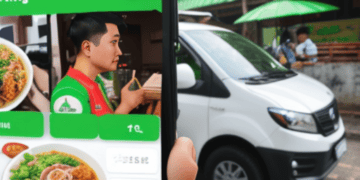In Thailand, food delivery drivers working for platforms like Grab are experiencing a significant decrease in their earnings due to a reduction in pay rates and an increase in competition. Piti, a 26-year-old Grab delivery driver from Bangkok, reports a noticeable drop in his daily income, from approximately 2,000 baht ($57) to around 900 baht ($25). This decline is attributed to a decrease in the starting rate per food order and a surge in the number of drivers on the roads.
The situation mirrors broader trends in Southeast Asia’s competitive market for super apps, where platforms like Grab and Line Man face financial struggles. Despite Grab’s status as a high-value tech unicorn, it has encountered difficulties in achieving profitability, leading to significant job cuts. Similarly, Line Man, a delivery app by Line Corp.’s Thai unit, reported a significant loss in 2021, despite an increase in revenue.
The Thai market, crucial for companies like Grab, is seeing a contraction in the food delivery business value compared to 2022. Drivers from various platforms have observed a reduction in their basic pay per order, with no clear explanation from the companies. For example, Pon, a driver for multiple platforms including Robinhood, noted a drop in his basic pay from 43 baht ($1.21) to 39 baht ($1.10) per order.
Drivers are adapting by working across different platforms and supplementing their income through ride-hailing services like Bolt. However, the lack of a fixed salary in the gig economy means drivers are dependent on the number of hours worked for their earnings.
Industry experts suggest that as companies like Grab shift their focus from growth to profitability, drivers, merchants, and consumers will likely face less favorable conditions. In response to the profitability challenges, platforms are exploring diversification of revenue streams, including financial services and integration with other services.
This shift in the gig economy landscape raises questions about the future viability and impacts of such business models, which initially promised attractive incentives but are now adjusting to the realities of profitability and market dynamics.
Stay on top of supply chain news with The Supply Chain Report. Enhance your international trade knowledge with free tools from ADAMftd.com.
#ThailandFoodDelivery #GrabThailand #LineMan #FoodDeliveryDrivers #GigEconomy #SoutheastAsiaTech #DeliveryAppCompetition #RideHailing #GigEconomyChallenges #GrabDrivers #LineCorp #RobinhoodApp #BoltThailand #FoodDeliveryMarket #TechUnicorn #ProfitabilityChallenges #DeliveryDriverIncome #MarketContraction #RevenueDiversification #FutureOfGigEconomy #SuperAppStruggles #SoutheastAsiaTechTrends















